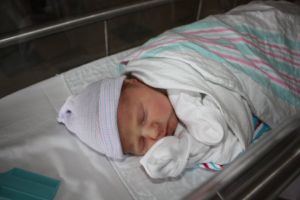[ad_1]

early detection and intervention for infants
born with hearing loss.
When it comes to childhood speech and language development, as well as overall health and well-being, there is no question that hearing ability plays a critical role. From delays in the development of both expressive and receptive communication to communication difficulties with peers leading to poor self-esteem, hearing loss has a direct effect on life outcomes.
Now it turns out an important ongoing study in Australia could have long reaching effects, including influencing clinical pediatric hearing practices in the United States.
Due to Congress’s passage of the Newborn and Infant Hearing Screening and Intervention Act of 1999, newborn hearing screening is now mandatory in a majority of states. But while the act helps with coordination and funding of statewide programs, the fact is the funding needs to continue. Unfortunately due to significant flaws in the studies and methodology, past studies about the efficacy of newborn hearing screening have reported the program to have only “moderate” outcomes. One example is the U.S. Preventive Services Task Force study commissioned in 2008 by the U.S. government, which had lukewarm results. In order to guarantee the continuance of newborn hearing screening programs well into the future, strong irrefutable evidence was needed.
This brings us to the importance of the new study on children with hearing loss conducted in Australia.
The study, called the Longitudinal Outcomes of Children with Hearing Impairment (LOCHI), was done by the HEARing Cooperative Research Centre and assessed children with hearing loss at 6 and 12 months after the switch-on of a hearing aid or cochlear implant. The children were reassessed at ages 3, 5 and 9 years, and researchers plan to assess the children again at ages 15 and 22 years. In addition to the longitudinal assessments, parents, teachers and caregivers are also asked to report about the children’s developmental progress through questionnaires. The longitudinal study, with 451 families participating, is now in its 11th year.
The purpose of the study is to compare the outcomes of children with hearing loss who were identified early verses those who were identified later. Thus far the results are showing definitively that infants with hearing loss who are fitted with hearing aids or cochlear implants earlier have better language and learning outcomes than those children who are fitted later.
Two to 3 out of every 1,000 children in the United States are born with some degree of hearing loss, and even more lose their hearing at some point thereafter during infancy or early childhood. However the most important period of speech and language development occurs during the first three years of life, when the brain is constructing the nerve pathways necessary for understanding speech. This reinforces the fact that early diagnosis, intervention and treatment is crucial in the case of hearing loss is crucial.
The new study differed from previous studies in several ways. First, this is the first time information of this kind has been collected at a population level longitudinally. A population-based study was possible because newborn hearing screening is universal in Australia. The study was also executed as a prospective study, meaning all participants started at the same time. In addition, all children with hearing loss in Australia receive services from the same audiological service, which is Australian Hearing. Thus far, the study results have not only proven efficacy, but they have been effective in changing pediatric clinical programs in Australia and are also beginning to be looked at across the globe, including in the United States.
“We have already translated the evidence on the efficacy of early detection and early provision of hearing technology into clinical practice. The same research outcomes are also playing a valuable role in guiding clinicians’ counsel for families with children who have been recently diagnosed with hearing loss,” said HEARing Cooperative Research Centre CEO Professor Robert Cowan.
Though the LOCHI study is ongoing, thus far the results have demonstrated how early intervention of infant hearing loss positively impacts what the children are able to achieve later in life. When it comes to infants with hearing loss, early diagnosis, intervention and fitting of hearing aids or cochlear implants benefits both spoken language and psychosocial development, especially in those crucial early developmental years prior to 5 years old.
And the study could have implications on other aspects of infant hearing loss as well. The LOCHI study has also revealed significant deficits in the pre-reading skills of many of the study participants, meaning next could be research into how best to address that particular skill set in children with hearing loss.
If your child’s newborn hearing screening resulted in a recommendation for a full hearing evaluation, be sure to follow up with a hearing care professional who specializes in infant hearing loss. This will ensure the best possible language and psychosocial development outcomes for your child.
[ad_2]
Source link

